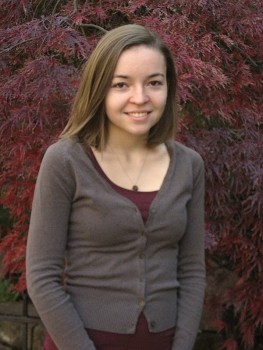Anna Brockway '12 Earns Science and Technology Policy Junior Fellowship

Anna Brockway '12
Details
Anna Brockway '12 has earned a Science and Technology Policy (STP) Junior Fellowship, an initiative of the Energy Efficiency and Renewable Energy (EERE) division of the Department of Energy (DOE). The junior fellowship, which is offered to recent bachelor's degree recipients, is a two-year educational and professional development program created to provide scientists interested in renewable energy with the opportunity to experience policy-related projects.
Brockway will be working with the DOE's SunShot Initiative in Washington, D.C., starting in January 2013. The program drives research, manufacturing and market solutions to make solar energy resources more affordable and accessible for Americans. Brockway and the other fellows assigned to SunShot will undertake leadership roles in beginning new research and development efforts aimed at lowering the cost of solar energy to below $1 per watt by 2020.
“I will get a deeper introduction to the role of the federal government in clean energy development and the variety of ways in which the Department of Energy works with the scientific community to foster the meaningful development of clean, renewable energy sources,” says Brockway.
The STP Fellowship will provide Brockway with a yearly stipend, health insurance, relocation expenses, a $10,000 per year travel allowance to further scientific and professional development activities, and admittance and accommodations for the annual EERE research meeting.
“In some sense, this is the equivalent of a hybrid between the Fullbright, Rhodes and Watson scholarships for solar energy research,” says Assistant Professor of Chemistry Joshua Schrier, who was Brockway's thesis advisor.“She has direct access to program managers at DOE for the next two years, intellectual freedom to pursue the topics she is interested in, significant travel funding to attend conferences and meet with experts, and, ultimately, her reports may influence DOE funding decisions.”
Brockway, a chemistry major and philosophy minor who is interested in studying for her Ph.D. after the completion of her two-year fellowship, calls Schrier her mentor and credits him with teaching her how to apply her chemistry work to clean energy issues. Her senior thesis on gas separation using nanoporous polymeric membranes had sustainability implications, as one of the compounds she proposed and investigated (PG-ES1) was found to be highly efficient at separating carbon dioxide. (Carbon dioxide is one of the primary greenhouse gases contributing to global climate change, so finding a way to separate carbon dioxide from power plant exhausts and reducing emissions is an important step in working to prevent climate change.) Brockway and Schrier have co-authored a paper, currently under review at the Journal of Physical Chemistry, on their work with PG-ES1, and, along with Associate Professor of Chemistry Fran Blase, they have filed for a provisional patent on the compound.
“Not many recent graduates have the broad preparation in basic and applied science research that she has,” says Schrier.“I think that [the fellowship selection committee members] were rightfully impressed by her scientific research that she did as an undergrad… and by her ability to connect her work to policy issues.”
“I am passionate about clean energy development and implementation, and I know that I want to work in this field in the future,” says Brockway, who was a fellow at the Massachusetts Clean Energy Center over the summer and who is currently finishing up a project for the Clean Energy States Alliance.“This fellowship will help me understand whether I want to do that from a more scientific or policy standpoint. Ideally, though, I would ultimately like to help connect scientists and policymakers to further the smart development of clean, renewable sources of energy.”
-Rebecca Raber



